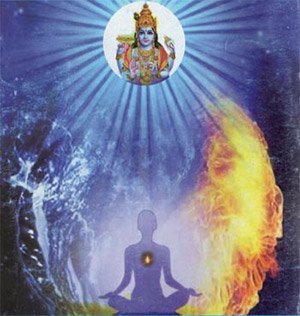Siddhanta Sangraha of Sri Sailacharya
by E. Sowmya Narayanan | 2008 | 30,562 words
Siddhanta Sangraha Chapter 14 (English translation), entitled “the eligibility of salvation to all” as included in the critical edition and study. The Siddhanta Samgraha is a Sanskrit philosophical text dealing with Vishishtadvaita in five hundred Sanskrit verses. It was written by Shri Shailacarya (18th century) and closely follows the philosophy of Vedanta Deshika (13th century).
Chapter 14 - The Eligibility of Salvation to all
131. If this view is not accepted then the līlārasa (līlā vibhūti) of Śrīpati (the Supreme Being) will get affected. But this view is not fully accepted. Strictly speaking baddhajīvas are entitled to attain liberation (mukti) according to our tradition and there is no incapable jīvas.
132-133. If it is doubted that the līlopakaraṇa jīvas (who are the cause of the Līlā of Īśvara) will not be there after some time then there arise the fallacy called līlāvighāta. It will not be treated as a dośa or fallacy because it happens according to the free will of God or Īśvara. The view that there will be eternally bound souls and if this is not admitted then the Supreme Lord will be bereft of sportive recreation is criticized with a following analogy. There is a scriptural statement—‘ekampāde noddharati sa līlārtha’ whose meaning is to be understood through the Upabrahmaṇa text ‘akṣayyahum vai cāturmāsya yājinaḥ sukṛtam bhavati’. This means that ‘one who performs the cāturmāsya ritual, will attain a never ending and everlasting fruit. But in reality the result achieved is not everlasting but only lasts for a longer period. In the same way there are certain individual souls who are bound to transmigratory existence for a longer time and not eternally bound.
134. The Supreme Lord, who is innately compassionate remains alike to all the individual souls (Jīvas). So He cannot be cruel and as such cannot confine some of them to eternal saṃsāra. In the beginningless saṃsāra, He only expects them to adopt either of the means namely, Bhakti or prapatti, which is the approved result of accidental merit (yādṛcchika sukṛta). It cannot be said that the sarveśvara being merciful is not able to do anything in the case of certain sinners.
135. There is nothing impossible for Īśvara, who is Omni-Potent (capable of doing everything). Therefore, all the jīvas are eligible to get salvation and there is no obstacle in this regard. As per the free will of the God that all the sentient beings (cetanas) will get salvation by His grace at the appropriate time.
136-137. If it is contended that what is the evidence (pramāṇa) to prove the free will of God that everyone should get salvation then, the sarvasesitva[1] of the God according to the scriptures is the one and only evidence.
138. If it is accepted that the nitya saṃsāri[2] state exists then the innate qualities of Īśvara such as kāruṇya etc. becomes purposeless. Therefore the view that there are nitya saṃsāris is rejected.
139. The above statement is clearly stated by Śrī Vedānta Deśika in the ninth śloka of eight decad (daśaka) of Dayāśataka.[3] It should be properly understood by the learned.
140-141. The same idea is conveyed in the first act of Saṅkalpa Sūryodaya.[4] It states that by the grace of Sarveśvara all the jīvas are entitled to attain liberation. The individual soul who are associated with karma are two fold, namely, mumukṣu (one who desirous of salvation) and amumukṣu (one who is not interested in salvation.
Footnotes and references:
[1]:
Nyāya Siddhāñjana, p. 234
[2]:
Tattva Muktā Kalāpa, 11.227.
[3]:
Cf. Dayāśataka, verse-79
[4]:
See Saṅkalpa Sūryodaya. 1-81-84
Conclusion:
 This concludes The Eligibility of Salvation to all according to Vishishtadvaita philosophy explained by Shri Shailacarya. This book follows the model of Vedanta Deshika although the Vishishta Advaita school was originally expounded by Shri Ramanuja. Vishishta-Advaita is one of the various sub-schools of Vedanta which itself represents one of the six orthodox schools of Hindu Philosophy. They highlight the importance of the Upanishads, the Bhagavad Gita and the Brahma Sutras.
This concludes The Eligibility of Salvation to all according to Vishishtadvaita philosophy explained by Shri Shailacarya. This book follows the model of Vedanta Deshika although the Vishishta Advaita school was originally expounded by Shri Ramanuja. Vishishta-Advaita is one of the various sub-schools of Vedanta which itself represents one of the six orthodox schools of Hindu Philosophy. They highlight the importance of the Upanishads, the Bhagavad Gita and the Brahma Sutras.
